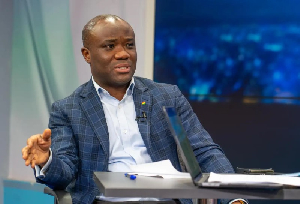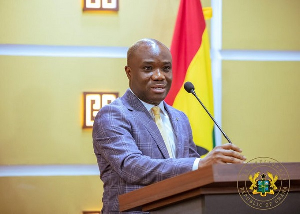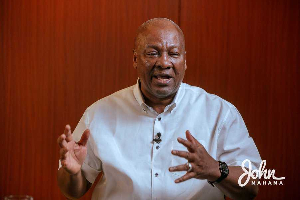Who Are We Going To Pay For It?
- Bui dam (Bui City) $600 million
- Proposed Military Hospital in Kumasi $130 million
- Commercial loan (Sectoral and liquidation of Ghana Airways) $61 million
- Cross-border electricity trade $45 million
- Presidential Palace $41 million
- Strengthening of Parliament $25 million
- Armed forces Housing project $20 million
- Ghana or NPP@50 $20 million
- Water Project for Senya Beraku E 4 million
- Ministry of Defense office complex $5 million
My fellow Ghanaians, we are in a very tight and troubling corner! The business of acquiring and using foreign loans in Ghana has taken a troubling turn and that gives me a lot of Maalox moments and I hope it does you too! Not long ago, during the P(NDC) era, and funded mainly by loans, the World Bank was touting an economic miracle that turned out to be a shinning farce. In the pale ashes of this canard sprouted a ballooning national debt of $6.3 billion and counting. Many wondered what this debt, mainly pillared by foreign loans, was used for. Besides a few relics like the Arko Adjei flyover and dotted unsustainable projects, there is nothing to show for the $6.3 billion that we owed after Rawlings left office. Coming from a government that was predicated on murdering people like Felli, whose only sin was to take a 50,000 Cedis loan, this must be very painful to swallow. $4.2 of the $6 billion debt came from the World Bank as credit for implementing its recommended Economic Reform Program (ERP). What we observed, alongside this shocking revelation, was a new class of rich socialist wanna be public officials, led by the fake holy worrier named Jerry Rawlings John. If Rawlings was able to educate all four kids overseas, acquire lands, buildings, speed boats, luxury cars and many other props normally reserved for the rich and famous, how much did his phalanx pocket? Who really was watching the process of acquiring these loans and what they were used for? Does anyone doubt that a big chunk of these loans ended up in corrupt hands? That, part of these loans was forgiven without making the PNDC account for every pesewa is a shame that will continue to haunt us.
Notice that we have been there before. When the ignorant Acheampong came to power through the barrel of a gun in 1972, he, out of suffocating frustration, repudiated our noose tightening debts. The impact of this action (Yentua) was disastrous. The art of taking loans started right after we got our independence. Though on a much smaller scale, we still had to borrow money to meet challenging needs and demands. Now we borrow money to barely survive. In some instances, we have to borrow to build infrastructure and also plug budget shortfalls, especially when donor countries negate on their promises. Recently, Bono and his henchmen pushed for debt forgiveness for HPIC countries like Ghana. I knew then, as I do now, that, debt forgiveness without stringent responsibility requirement will fail. It is not difficult to make that determination from a behavioral standpoint. As B. F. Skinner ably showed in his experiments, you get more of the behavior that you reward. Therefore, if you forgive an irresponsible and dependent debtor, expect that debtor to acquire more debt sooner or later. In fact, this lesson stands out in the Grameen effort championed by Dr. Yunus the Nobel Prize winner. For this reason and perhaps many more, the Grameen bank never forgives debts! Never! They would rather consider loaning a responsible debtor more to help pay previous loans than cancel his or her previous debts. I hope our lenders will take note!
Given the cry for mercy on HIPC countries, two-thirds of our debt was forgiven leaving us with a $2.1 billion debt to contend with. What this debt reduction, coupled with modest economic adjustments, like the mono inflation lowering effort by the NPP, has done, is to improve our credit rating. This means that we can again go out and borrow responsibly. And boy, are we borrowing like crazy! There is not a day that goes by without reading about loans that have either been acquired or are in the pipeline. It is even obvious that some are borrowing to implement projects that will advance their political future. It is fairly self evident that borrowing and begging is the modus-operandi and default option for our government. We must painfully admit that we are a nation of beggars and borrowers. I know it is hard to accept given our proud history and heritage but we are mendicants. So, the issue now is not to borrow or not! The issue now is to bring accountability to the borrowing process and make sure that the money taken on behalf of the people is used for them. We must make sure that the sitting government is not profiting by transacting these loans. Also we must make sure that majority of these loans are sustainable. By sustainable, I mean the money can be invested in such a way that it generates the seed money for repayment plus profits to fund other projects without further borrowing.
Osafo Marfo, the ex-finance minister, in an effort to distance himself from the now calamitous IFC and CNTCI scandals, made an interesting explanation that helps us understand how the loan procurement process works in Ghana. He outlined three processes which include, bilateral (nation to nation), multilateral (between nation and several nations), and private sources. In doing so, the ex-minister of finance explained that the minister of finance is responsible for dealing with the first two processes. The third process, which is private sourcing, is open to every Tom, Dick and Harry in the cabinet, given the project in question. According to him, the IFC and CNTCI loans were done through the third process. He had to send it to parliament as the finance minister. This means that once the cabinet agrees on a loan sourced by a member for his or her project, the finance minister, whether he agrees or not, must champion it to and through parliament. So, even though he did not source the IFC and CNTCI loan, he had to either champion it or resign his post. In the end, his post was much more important to him than the dubiety and mendacity that fogged both loans.
My friends, I am very troubled by the ease with which cabinet ministers can secure loans. I am troubled by the fact that, often, details about who contracted the loans, what the interest rate is, how the loan is going to be paid, who is executing these projects, sustainability of such projects and many more pertinent details are often left out of the news. This idea that every four years we vote people into office who acquire the mandate to take loans on our behalf and yet refuse to furnish us with the clean details of our responsibility is very troublesome. Not only that, but the fact that any incumbent government can boast that it has fulfilled its promises to the people at a time when their debt keep mounting is to me very deceptive. We have to pay close attention to who is doing what when it comes to loans and know that unless we keep our eyes open, these political crooks will take us to the cleaners. It is the duty of the government to give us all the details. If we are responsible for the loans then we must be furnished with every little detail immediately.
If government is as easy as sourcing and signing loans on behalf of the people, why bother? If government means that a crop of government officials can take loans and invest in projects they deem fit, without any public discourse, then we are in trouble. If government means that parliament, majority of which belongs to the ruling party, rubber stamps any stupid loans for whatever equally stupid projects, then, this democracy of ours is going to hell in a hand basket.
My fellow Ghanaians, we are going to need much more rigor, responsibility, attention to details and accountability to make sure that we are taking only necessary loans and using them efficaciously. In one instance, when a loan for the liquidation of Ghana Airways was under discussion, Mr. Stephen Balado-Manu (MP-Ahafo Ano South) is reported to have inquired about the assets of Ghana Airways. Now here is an MP asking about an entity for which we have acquired a loan to liquidate before voting. Do you know what he was told? Well, Mr. Felix Owusu Adjapong, Minister of Parliamentary Affairs said, “members could be furnished with the details of that information, if they so desired.” If they so desired? Should they not have that information before voting? I hope this squib gives you a clue about the decadent practices going on with this loan business in parliament.
If you think this is a partisan issue, you are wrong! I have no doubt that almost any other political party will fall in to this debt trap. Look, Atta Mills was quick to remind the NPP folks that the NDC took loans to do projects and even left them enough to cover the basics of government. If taking loans is all that one needs to run a government, why was the NPP bitching that they were left with no money to run the government? I guess they’ve now caught on to the dirty trick of defaulting to loans and are enjoying the bliss. The NPP now knows how to source loans even more than their predecessor. If you think this loan regime is about to end, please think again! The current finance minister, Baah Wiredu, is reported by Reuters to have hinted that by July 07, Ghana will be ready to tap into the Eurobond market. In the report titled “Ghana Eurobond to open new chapter for Africa, Reuters reports that, Mr Baah-Wiredu said, “lead managers UBS and Citigroup had been mandated to raise between $500 million and $750 million for the west African country, which plans to use the money to develop its energy and telecommunication sectors and for housing and afforestation.” So, our debt level is going back to where it was or even higher. And guess what? We will need Bono and his bunch of naïve activists to do our bidding again! Does anyone in his right mind believe we can pay these loans given the current dysfunctional economic system that we champion? Who will pay these loans? Our poor and destitute fishing kids? What really is our game plan to be debt free? Do we have any?
Let me make a few things very clear. I realize that in certain instances, we don’t have a choice but to borrow money. What I will like to see happen is that, we borrow money only and only if we have to. More importantly, we must look at local options before we go for foreign loans. Loans or begging should not be our default answer to every little need or concern. What about the Build Operate Transfer (BOT) process used to fund the $135 million waste-to-energy plant at Oti near Dompoase in the Kumasi metropolis? Not bad huh? It is very obvious that some of the projects for which we are borrowing do not make sense. We must not borrow to pay for Chinese architects, Indian builders and British printers. Ghana at age 50 must be able to do some of these things from within. We must shy away from borrowing for direct consumption purposes. Borrowing for capital investment projects must be positioned in a way as to make these loans payable from the investments. This means that we must stop government freeloading and unfortunately, subsidies in some instances. This mentality of getting something for nothing must be chalked to the wall. I am of the view that we need a lot more sunshine on these loans. Furthermore, all loans must attract stringent project reviews, citizen involvement clauses and payment schedules based on realistic fact based projections.
We must take the management of our loans very seriously. We must make sure that we are negotiating reasonable loans that mutually benefit ourselves and the lender. We should punish vigorously, anyone, especially politicians, who breathe bald face corruption into the loan process. Our parliament must play its oversight role. The legislature should be in charge of our purse strings not the executive. We must revoke that practice of allowing any other minister to source loans for their pet projects. Ministers can identify projects but they must be divorced from the process of sourcing loans at all cost. All loans must go through parliament with the help and guidance of the minister of finance only. Parliament must scrutinize these loans and make sure they are viable before approving them. The credibility of those working on these loans must be verified. We must prioritize our needs and ditch, at all cost, frivolous projects like a presidential mansion at this point in our country’s history. In the end, the people of Ghana must be vigilant or have themselves to blame. The lenders do not give a rat’s ass about us. Our politicians want every little crack to make money for themselves. This leaves the real people with the sacred task of making sure that both parties work in our interest all cost. This issue is so important that we need a monthly gazette, detailing all loan activities, past and present, to help us gauge what is going on with this borrowing business. Who is really benefiting from these fat loans? Enough of the laissez faire attitude my fellow Ghana!! Get up and stand up for your rights!



















